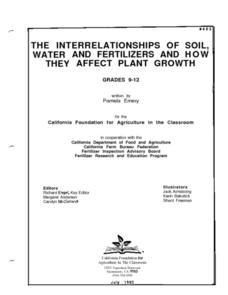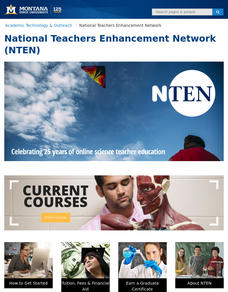University of Richmond
The Forced Migration of Enslaved People 1810-1860
Slavery not only involved the forced migration of African people from their homes, it also meant the forced removal of people within the United States. Using data and interactive graphics, scholars see how the tragedy of human slavery...
Curated OER
The Interrelationships of Soil, Water and Fertilizers and How They Affect Plant Growth
Students examine how different nutrients in the soil and fertilizers affect plant growth. In groups, they participate in a role play in which allows them to see the interactions of humans and plants. They also read articles and record...
Curated OER
Week 3: Pollution Source and Effects
Lab groups set up an experiment to observe what happens over time in collected pond water when fertilizer, representing pollution, is added. This website does not include student lab sheets, but background information, materials, and...
California Academy of Science
Human Evolution
As the great and hilarious Tim Minchin once said, "Science is simply the word we use to describe a method of organizing our curiosity." Science is more than just a guess; it is based on questions, observations, and evidence. High...
Curated OER
Eutrophication Lab
Middle schoolers examine the effects of detergents and fertilizers on aquatic life and describe algae. Students define the term eutrophication as the process by which a body of water, such as a pond, lake, stream, or river, has a sudden...
Curated OER
Fertilizers, Pesticides and Human Health
High schoolers define several vocabulary terms related to chemicals and toxicology. Students calculate chemical concentrations in water and explain the toxicological principles that govern safety of substances. High schoolers conduct an...
Curated OER
Human Embryonic Stem Cells
Students use the Internet to discover information about human embryonic stem cells from the National Institutes of Health. They examine different sides of the debate to use or not to use stem cells. They can also listen to speeches given...
Curated OER
The Effects of "Recreational" Drugs on the Development of Chick Embryos as a Model for Human Embryogenesis
Young scholars conduct experiments on fertilized chicken embryos to determine the possible developmental effects that various recreational drugs (caffeine, alcohol, nicotine, and aspirin) might have on them.
Curated OER
We've Come a Long Way, Baby!
Students study technology and the different reproductive technologies available today. In this human reproductive technology instructional activity students describe how engineers create technologies to improve the health of mothers and...
LABScI
Genetic Equilibrium: Human Diversity
Investigate the Hardy-Weinberg Principle to explain genetic equilibrium. The 10th lesson plan of a series of 12 is a laboratory exploration of genetic equilibrium. Your classes use a mixture of beans to model allele and genotype...
Curated OER
Composting
Using 2-liter bottles, junior ecologists create composting tubes in which they place nitrogen-rich and carbon-rich materials. They observe what changes occur over two weeks' time. Provide more specific direction to your class as to what...
Curated OER
Water Pollution
Fifth graders study the impact of human activity on water quality and on the ecosystems of Earth. After a discussion on the various ways that water can be polluted, groups of youngsters get together to figure out the best way to clean a...
Curated OER
Salt Marsh in a Pan
Students create a model of a salt marsh to discover the impact of pollution and human activities on water-based habitats including bays and the ocean. They recognize the relationship between natural and developed areas. Students impact...
Curated OER
Water Pollution
Here is a fine lesson for fifth graders that will give them an idea of the variety of impacts that human-introduced pollutants have on the environment. After an initial class discussion and teacher-led demonstration, pupils brainstorm...
Curated OER
Erosion
Fifth graders engage in some activities that will help them to identify erosion and explain the causes of erosion. They also look into ways that humans can slow the process of erosion in some cases. After a teacher-led demonstration,...
Curated OER
Do Human Practices Affect Water Quality?
Students determine if human practices have any noticeable effects on the quality of stream life as measured by the presence of certain macroinvertebrates. They collect, preserve and identify macroinvertibrate samples and quantify the data.
Curated OER
Zebrafish Development
Middle schoolers examine the early development of zebrafish as a model for embryo development in humans. They observe various stages of zebrafish reproduction from sperm and eggs to fertilized eggs and hatchlings.
Curated OER
Fertilizers, Pesticides and Health
Pupils apply real data to create and calculate algebraic equations. Students create a visual to represent the concentration for one part per million and apply unit analysis to verify measurement computations. Pupils define the use of a...
Curated OER
Human Ecology: How it Relates to Population
Ninth graders are introduced to the concept of population. In groups, they research the problems associated with overpopulation and underpopulation. They practice calculating birth and death rates and discus how they can be used to...
Curated OER
Pea Soup Ponds
Students perform an experiment where they learn how water can be polluted by algal bloom. They grow algae with different concentrations of fertilizers or nutrients and analyze their results.
Curated OER
Finding Your Way On the Farm
Third graders explore the food industry by viewing a presentation about farming. In this farming geography lesson, 3rd graders view globes and maps while identifying the prime geographical locations for fertile land. Students view a...
Curated OER
The Effects of Alcohol and other Teratogens: A model using Zebrafish
Students investigate the interference of various drugs on an embryo through experimentation. This is an open-ended lab to allow students to see effects of various chemicals humans choose to put in their bodies and create questions they...
Curated OER
Assisted Reproduction
Students are actively involved in presenting some of the issues in implanting previously frozen embryos through a cooperative learning lesson. This lesson helps students to develop decision-making skills through discussing various types...
Curated OER
The Female Reproductive Organs
Students identify the female pelvic organs, understand the changes that occur during puberty, and learn what specific organs are involved in these changes. In this biology lesson plan, students learn the path of the human egg cell during...

























